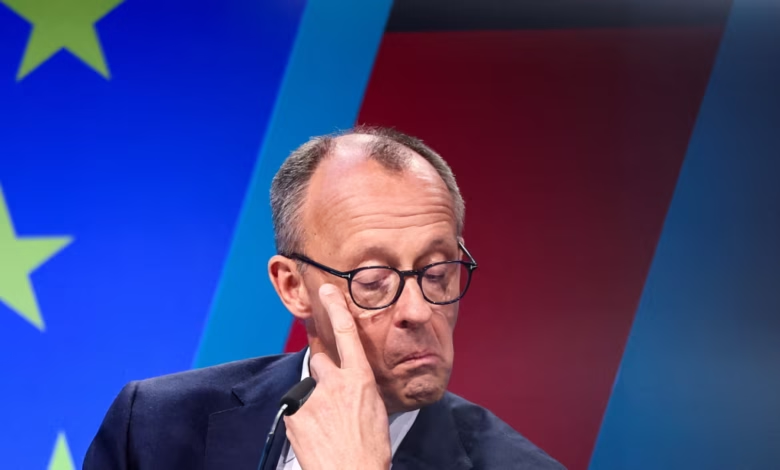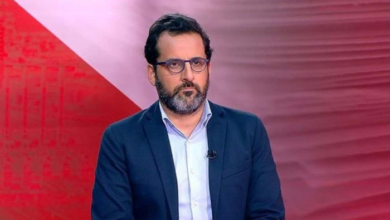
By Chris Reiter and Will Wilkes – The Guardian:
Merz takes charge this week, as German industry buckles and social fractures deepen. He will struggle to bring a wary public with him
Afew weeks before Germany’s federal election in late February, Friedrich Merz was forced to backpedal after a daring gambit went awry. His attempt to win votes by forcing through a hardline crackdown on migration had caused a rebellion in his own Christian Democratic party (CDU). Instead of positioning himself as a strong leader, he undermined the entire German political establishment.
Merz’s strategy involved breaking a taboo by relying on far-right nationalists to pass legislation for the first time in Germany’s postwar history. The move fractured the country’s normally consensus-driven centrist parties in the Bundestag, sparked mass protests and led to a rare public rebuke from the former chancellor and CDU leader Angela Merkel.
Despite the backlash, Merz stuck to his trademark swagger and refused to back down from setting a disturbing precedent. His only nod to regret was admitting he would have liked to have seen a different result. This is the man taking the reins of Europe’s central power, and the continent has cause for concern.
The 69-year-old conservative will be sworn in as chancellor on 6 May, at a moment of profound reckoning for Germany. The postwar promise of Wohlstand für Alle (prosperity for all) is slipping away, with soaring inequality and a fifth of Germans facing poverty or social exclusion. Beyond the enduring east-west divide, new fractures split secure professionals from the precarious working class, old from young, urban from rural, homeowners from renters. Roads and railways are crumbling, digital infrastructure is behind the times and the education system is struggling to equip a shrinking workforce for the demands of an evolving economy.
The country’s industrial base is buckling under high energy costs, outdated technology and suffocating bureaucracy. The once dominant car manufacturers are reeling, caught between their own hubris and growing competition from China. Donald Trump’s trade wars have turned the economy’s dependence on exports into a glaring vulnerability, while Vladimir Putin’s aggression is forcing Germany to confront the threat of war.
Against this backdrop, the anti-Europe, pro-Russia Alternative für Deutschland (AfD) party has drawn level with Merz’s CDU-led bloc in the polls, shattering the comforting illusion that Germany’s past had insulated it from the siren calls of nationalist populism. Germany’s domestic intelligence agency last week designated the AfD, which is now the biggest opposition party, a “confirmed rightwing extremist” force.
Faced with these challenges, Germany needs a unifier who can rally a divided nation with vision and purpose. But instead of a figure like John F Kennedy, who motivated the US with plans for a moonshot, it is getting an operator closer to David Cameron. Merz’s failed migration bill finds an echo in the former UK prime minister’s fateful Brexit gamble. Both politicians tried to harness nationalist, populist causes and lost control. The difference is that Merz still has time to change course, though his record offers little reason for optimism.
In the weeks since winning the election, the incoming chancellor has swung wildly back and forth. After flirting with the AfD on the migration crackdown, he took a harder line against post-election cooperation with the far-right and offered concessions to win over the Social Democrats for a governing coalition.
After campaigning on fiscal restraint, Merz made an abrupt U-turn on debt financing by hastily pushing constitutional reforms with the Social Democrats and the Greens to unlock hundreds of billions of euros in borrowing for defence and infrastructure. While changes to Germany’s restrictive debt brake had been long overdue and were cheered by European allies, the sudden move was viewed with scepticism at home and contributed to pressure from conservative allies, who worried that Merz was giving too much ground to the centre-left Social Democrats. He has responded by vowing to squeeze spending, mainly at the expense of Germany’s most vulnerable groups.
Trained as a corporate lawyer, Merz has never run a state, a ministry or even a district council. Known for being petulant and prickly, he gave up on politics after Merkel blocked his path to power, only returning to grasp his opportunity in the vacuum she left behind. But even then, it took him three attempts to secure the leadership of the CDU.
Rather than building bridges, Merz has often widened divides. In 2000, when he was vying with Merkel for control of the Christian Democrats, he proposed the concept of a German Leitkultur – which literally means “leading culture” – and called on migrants to conform to a set of core traditions to truly belong.
In late 2023, he revived that debate. In trying to imbue the vague term with meaning, Merz suggested that buying a Christmas tree was part of being truly German – excluding Jews, Muslims, Hindus and secular Germans in the process.
It wasn’t a slip of the tongue. The man from rural Sauerland in western Germany has called migrant children “little pashas”, accused Ukrainian refugees of “welfare tourism” and claimed that foreigners abuse Germany’s health system “to get their teeth redone” – an allegation so inflammatory that it drew a public rebuttal from the German Dental Association.
His reputation and recent actions have Merz limping towards office, with an approval rating of just 36% – between the leftist Heidi Reichinnek and the AfD co-leader Alice Weidel, according to a recent Bild poll.
Far from being a knockout blow to the advance of the AfD, its classification as extremist risks playing into the party’s anti-establishment narrative. The reaction from the Trump administration – secretary of state Marco Rubio called the German intelligence agency’s move “tyranny in disguise” – underscores how fraught transatlantic relations have become.
To turn things around, Merz needs to find his feet fast, show that he can be the chancellor for all Germans and chart a path towards the future. With his debt-fuelled spending package, he has the resources at his disposal. But aside from boldly proclaiming that “Germany is back” on the world stage, he has made little effort to sell the plan to the public or set out goals and objectives. That needs to change, and a bold reset of the social contract is needed.
The reality is that Merz’s funding plan is Germany’s moonshot, but so far it lacks a launch pad and a destination. The country won’t have access to these resources a second time and the new chancellor needs to make it count. Otherwise, the AfD will find itself with a clearer path to power. By appealing to populist sentiments and deepening divisions within Germany, Merz may inadvertently empower a more radical political shift, much as Cameron did in the UK.





